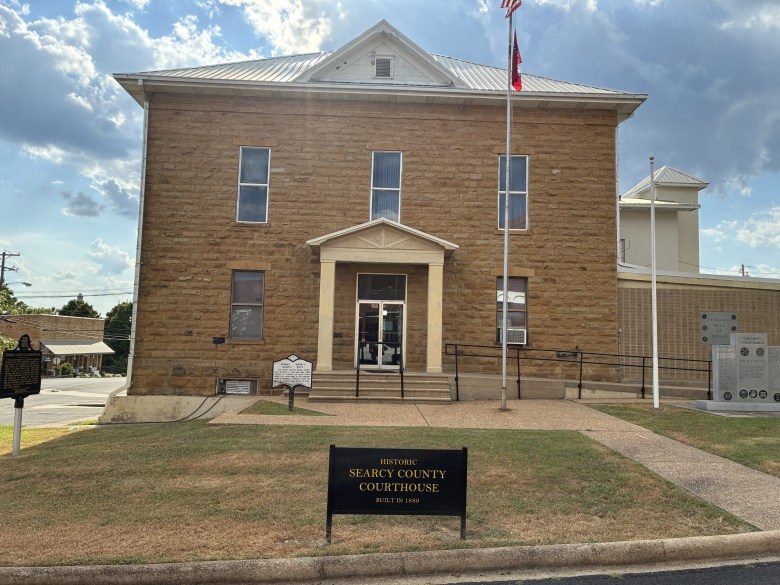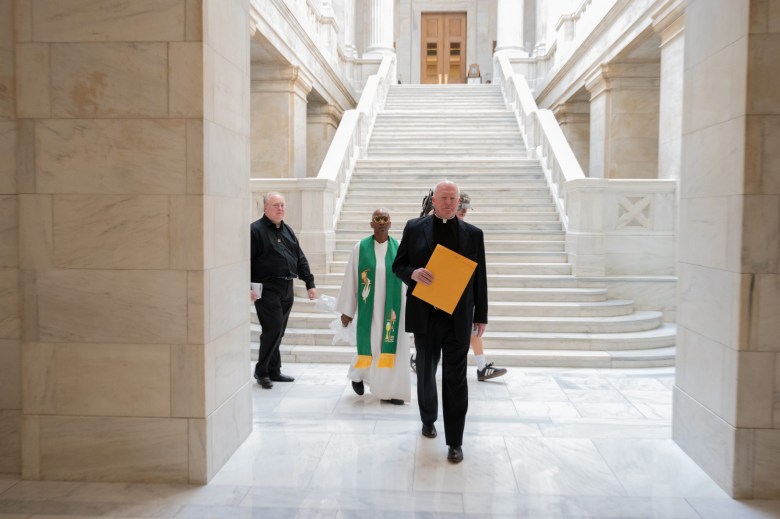At a county meeting on Monday night, Searcy County became the first to reject a moratorium on wind energy installation, despite tremendous pressure from the anti-wind movement in Arkansas.
Rather, an emergency ordinance was approved by the county’s officials, known as justices of the peace, who reiterated that developers must submit proof of their wind energy projects to the county clerk within 30 days and that all wind facilities in Searcy County must abide by a new, restricted state legislation.
Senate President Bart Hester (R-Cave Springs) and organizations organized to oppose the proliferation of renewable energy projects in Arkansas pushed the new Wind Energy Development Act through with bipartisan support earlier this year, and the Searcy County ordinance requires developers to adhere to it.
These organizations, known as Concerned Citizens of the Ozarks and Stop Wind Farms Arkansas, are mostly focused in Carroll County, where the global renewable energy business Scout Clean Energy is presently building its Nimbus Wind project. There was strong opposition to the initiative from several locals. Moratoriums have been imposed in Carroll, Boone, Madison, Newton, Cross, and Crawford counties by opponents of wind and solar energy projects.
In Searcy County, a small county in the Ozarks’ Buffalo River valley, where the massive German energy giant RWE is in the very early phases of a possible project, they also attempted to accomplish the same. Landowners have already signed leases with the business. Landowners grant leases and easements to private renewable energy firms like RWE, enabling the businesses to erect solar panels or wind turbines on their property in exchange for sizable income streams.
Although it was unclear if the company would be eligible for an exception to the new laws established by the Legislature, RWE’s project will be permitted to proceed without a moratorium. In addition to numerous other legal constraints, the corporation will have to comply with stringent setback rules if they are not exempt, which will make it much more challenging to locate wind turbines.
Prior to that, the emergency ordinance and the moratorium ordinance were sponsored by Republican justice of the peace Brian Ragland. During the Monday meeting, he stated that the Association of Arkansas Counties had informed the JPs that they would not be able to legally defend the moratorium in court if it were challenged by a landowner or the company claiming that they were denied a business opportunity or that their wind contract was rendered unfeasible. In order to proceed with the emergency ordinance, the JPs decided to lift the moratorium.
Following the discussion, Ragland told the Arkansas Times that he didn’t believe RWE could get a break from the new state regulations. Any wind projects that are under development by April 9 are exempt from the new rule. Another Republican JP, Wayne Witcher, expressed uncertainty about whether RWE’s Searcy County project would be considered under development by the deadline. In order to get around the tough new regulations, projects would have to have signed land leases and either started state and federal studies or started building the turbines by April 9.
Although Ragland and Witcher expressed their disapproval of wind farms, they both underlined that the county must abide by the law and that they should exercise caution when considering a moratorium in light of the legal information they received.
“As district officials, we are tasked with balancing budgets and making some small-level resolutions and policies, and we have a lot of outside influences coming into this county and trying their best to influence the decision of this quorum court,” Witcher added. We have limited jurisdiction, however, when you start discussing what state law says about this industry. Additionally, I believe that the public expects us to use our authority that we do not possess.
In contrast to state law, the Wind Energy Development Act permits county and local governments to impose more stringent regulations on wind energy projects. However, proponents of the wind project cited the Arkansas Right to Farm statute to contend that if the county attempts to impose a wind energy moratorium that would restrict their ability to utilize their land as they see fit, they may have grounds to sue the county.
Moratorium introduced in July
At a July quorum court meeting, where RWE project developer Tony Manning faced up against anti-wind activists like Julie Morton, who takes responsibility for the Wind Energy Development Act’s enactment, the moratorium on wind energy was initially proposed. Manning invited the entire Quorum Court and the County Judge to visit one of RWE’s wind farms to meet with landowners and hear how the project has affected a similar rural community in Texas after discussing the project’s economic benefits at the July meeting, which included millions in property tax revenue and payments to landowners for the project’s lifetime.
Manning stated in July, “I want to make it very clear what this county will lose if this project is killed prematurely by a moratorium.” Several farmers and landowners in Searcy County supported Manning, arguing that the moratorium effort infringed upon their private property rights. The county might gain a lot from the additional jobs and tax income, according to proponents of wind energy projects.
Morton, however, pleaded with the JPs to save Searcy County’s natural beauty from wind turbines, using rhetoric that suggested a wind project would bring the county nothing less than fire and brimstone. In addition to praising the Wind Energy Development Act, she urged lawmakers to enact a moratorium so that the county won’t be subject to an investigation in the event that RWE is found to be in violation of the new state law.
I’m here tonight to inform you that, according to public records, RWE may be attempting to circumvent Act 945. I want to reassure everyone that, should they attempt to do so, an AG’s inquiry will be conducted. In order to prevent my county from becoming involved in that probe, as well as because you need time to see what kind of destruction this monster is going to do, I would, if I were you tonight, enact a moratorium, Morton stated in her statement. It’s halfway between Marshall and Leslie, as you can see [on a project map handout], and that lovely little scenic overlook you have—well, there won’t be anything scenic left! There will be 700-foot-tall turbines and bare ridges! You could also be wondering why so many businesses have appeared. None of them are headquartered in the United States. Even though they have an office in Austin, RWE is a German company. They are all from Europe, the UK, or Canada, and they are here in part because we don’t have any regulations. We do now, though. However, they are also here because their Green New Scam has been exposed, which has made it impossible for them to conduct business as usual in their own nations!
Prior to being shot down at the beginning of the first Trump Administration, Morton, a native of Van Buren, gained notoriety in the 2010s for her campaigning against the Clean Line transmission project, which sought to deliver clean energy from Oklahoma to the eastern shore. Among many other states, Arkansas would have been traversed by the transmission lines.
Following her presentation and speech, Morton argued with landowners who wished to keep the option to install turbines on their property if they so desired.
We have the option of giving our lovely green state to a foreign corporation to demolish, or we may preserve it so that future generations can appreciate it as much as we and our forefathers did. We don’t have to say we did when your kids and great-grandchildren stand up there and gaze at these bare ridges with these things falling all over them! “Morton said.” I thus beg you all tonight to resist giving a foreign corporation the authority that the law has granted you. Rather, defend your people and our stunning natural state.
Following the July meeting, state senator Missy Irvin (R-Mountain View), who represents Marshall in Searcy County, posted two comments on Facebook on RWE’s wind project plan. Irvin criticized the building of Nimbus in Carroll County and questioned whether RWE was adhering to the new rules.
At the July meeting, Witcher stated that a moratorium would be the end of the wind project and that it was not for the purpose of conducting environmental investigations. I will vote for what the majority of people in my district want if it is what the public wants. But a moratorium is not so that we can go off into our corners and study the environmental and economic impact on the county.
The whole July quorum court discussion over Searcy County’s wind energy moratorium may be viewed here.
It’s dragon-slaying time!
The Arkansas Times, which relentlessly defends the fundamental rights and liberties in our community, stands as a light of truth in an era when critical voices are being silenced more and more. Our commitment to provide uncompromising journalism has never been more important, especially with Arkansas in the center of a broad culture war that is impacting our libraries, schools, and public conversation. We can’t accomplish our goals of defeating dragons and holding those in positions of authority responsible alone. You can guarantee that independent journalism in Arkansas not only endures but flourishes by making a contribution today. We can join the fight and make a difference together.







